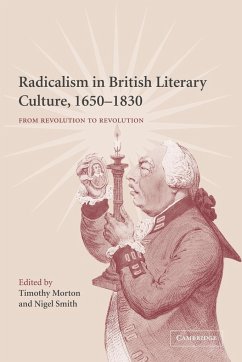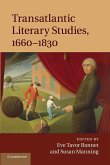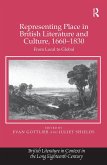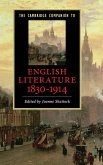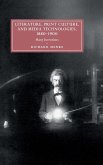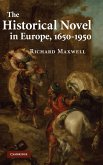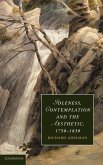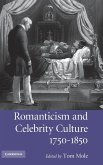Radicalism in British Literary Culture, 1650 1830
From Revolution to Revolution
Herausgeber: Morton, Timothy; Smith, Nigel
25,99 €
inkl. MwSt.
Versandfertig in 1-2 Wochen

13 °P sammeln
Radicalism in British Literary Culture, 1650 1830
From Revolution to Revolution
Herausgeber: Morton, Timothy; Smith, Nigel
- Broschiertes Buch
- Merkliste
- Auf die Merkliste
- Bewerten Bewerten
- Teilen
- Produkt teilen
- Produkterinnerung
- Produkterinnerung
Examines radical tradition in British literary culture from the English Revolution to the French Revolution.
Andere Kunden interessierten sich auch für
![Transatlantic Literary Studies, 1660 1830 Transatlantic Literary Studies, 1660 1830]() Transatlantic Literary Studies, 1660 183033,99 €
Transatlantic Literary Studies, 1660 183033,99 €![Representing Place in British Literature and Culture, 1660-1830 Representing Place in British Literature and Culture, 1660-1830]() Evan GottliebRepresenting Place in British Literature and Culture, 1660-1830192,99 €
Evan GottliebRepresenting Place in British Literature and Culture, 1660-1830192,99 €![Camb Comp English Lit 1830-1914 Camb Comp English Lit 1830-1914]() Camb Comp English Lit 1830-191452,99 €
Camb Comp English Lit 1830-191452,99 €![Literature, Print Culture, and Media Technologies, 1880-1900 Literature, Print Culture, and Media Technologies, 1880-1900]() Richard MenkeLiterature, Print Culture, and Media Technologies, 1880-190091,99 €
Richard MenkeLiterature, Print Culture, and Media Technologies, 1880-190091,99 €![The Historical Novel in Europe, 1650-1950 The Historical Novel in Europe, 1650-1950]() Richard MaxwellThe Historical Novel in Europe, 1650-195093,99 €
Richard MaxwellThe Historical Novel in Europe, 1650-195093,99 €![Idleness, Contemplation and the Aesthetic, 1750-1830 Idleness, Contemplation and the Aesthetic, 1750-1830]() Richard AdelmanIdleness, Contemplation and the Aesthetic, 1750-183052,99 €
Richard AdelmanIdleness, Contemplation and the Aesthetic, 1750-183052,99 €![Romanticism and Celebrity Culture, 1750-1850 Romanticism and Celebrity Culture, 1750-1850]() Romanticism and Celebrity Culture, 1750-185090,99 €
Romanticism and Celebrity Culture, 1750-185090,99 €-
-
-
Examines radical tradition in British literary culture from the English Revolution to the French Revolution.
Produktdetails
- Produktdetails
- Verlag: Cambridge University Press
- Seitenzahl: 296
- Erscheinungstermin: 31. Juli 2009
- Englisch
- Abmessung: 229mm x 152mm x 18mm
- Gewicht: 484g
- ISBN-13: 9780521120876
- ISBN-10: 052112087X
- Artikelnr.: 27065367
- Herstellerkennzeichnung
- Libri GmbH
- Europaallee 1
- 36244 Bad Hersfeld
- gpsr@libri.de
- Verlag: Cambridge University Press
- Seitenzahl: 296
- Erscheinungstermin: 31. Juli 2009
- Englisch
- Abmessung: 229mm x 152mm x 18mm
- Gewicht: 484g
- ISBN-13: 9780521120876
- ISBN-10: 052112087X
- Artikelnr.: 27065367
- Herstellerkennzeichnung
- Libri GmbH
- Europaallee 1
- 36244 Bad Hersfeld
- gpsr@libri.de
List of illustrations; Notes on contributors; Acknowledgements;
Introduction Timothy Morton and Nigel Smith; Part I. From Revolution: 1.
'May the last king be strangled in the bowels of the last priest':
irreligion and the English Enlightenment, 1649-1789 Justin Champion; 2.
Radicalism and replication Nigel Smith; 3. The plantation of wrath Timothy
Morton; 4. They became what they beheld: theodicy and regeneration in
Milton, Law and Blake Donald John; 5. Fasting women: the significance of
gender and bodies in radical religion and politics, 1650-1813 Jane Shaw;
Part II. To Revolution: 6. John Thelwall and the revolution of 1649 Michael
Scrivener; 7. Women's private reading and political action, 1649-1838
Charlotte Sussman; 8. The strange career of Richard 'Citizen' Lee: poetry,
popular radicalism, and enthusiasm in the 1790s Jon Mee; 9. William
Cobbett, John Clare, and the agrarian politics of the English revolution
James McKusick; 10. 'Not a reforming patriot but an ambitious tyrant':
representations of Cromwell and the English republic in the late eighteenth
and early nineteenth centuries Peter Kitson; 11. The republican prompt:
connections in English radical culture Paul Hamilton.
Introduction Timothy Morton and Nigel Smith; Part I. From Revolution: 1.
'May the last king be strangled in the bowels of the last priest':
irreligion and the English Enlightenment, 1649-1789 Justin Champion; 2.
Radicalism and replication Nigel Smith; 3. The plantation of wrath Timothy
Morton; 4. They became what they beheld: theodicy and regeneration in
Milton, Law and Blake Donald John; 5. Fasting women: the significance of
gender and bodies in radical religion and politics, 1650-1813 Jane Shaw;
Part II. To Revolution: 6. John Thelwall and the revolution of 1649 Michael
Scrivener; 7. Women's private reading and political action, 1649-1838
Charlotte Sussman; 8. The strange career of Richard 'Citizen' Lee: poetry,
popular radicalism, and enthusiasm in the 1790s Jon Mee; 9. William
Cobbett, John Clare, and the agrarian politics of the English revolution
James McKusick; 10. 'Not a reforming patriot but an ambitious tyrant':
representations of Cromwell and the English republic in the late eighteenth
and early nineteenth centuries Peter Kitson; 11. The republican prompt:
connections in English radical culture Paul Hamilton.
List of illustrations; Notes on contributors; Acknowledgements;
Introduction Timothy Morton and Nigel Smith; Part I. From Revolution: 1.
'May the last king be strangled in the bowels of the last priest':
irreligion and the English Enlightenment, 1649-1789 Justin Champion; 2.
Radicalism and replication Nigel Smith; 3. The plantation of wrath Timothy
Morton; 4. They became what they beheld: theodicy and regeneration in
Milton, Law and Blake Donald John; 5. Fasting women: the significance of
gender and bodies in radical religion and politics, 1650-1813 Jane Shaw;
Part II. To Revolution: 6. John Thelwall and the revolution of 1649 Michael
Scrivener; 7. Women's private reading and political action, 1649-1838
Charlotte Sussman; 8. The strange career of Richard 'Citizen' Lee: poetry,
popular radicalism, and enthusiasm in the 1790s Jon Mee; 9. William
Cobbett, John Clare, and the agrarian politics of the English revolution
James McKusick; 10. 'Not a reforming patriot but an ambitious tyrant':
representations of Cromwell and the English republic in the late eighteenth
and early nineteenth centuries Peter Kitson; 11. The republican prompt:
connections in English radical culture Paul Hamilton.
Introduction Timothy Morton and Nigel Smith; Part I. From Revolution: 1.
'May the last king be strangled in the bowels of the last priest':
irreligion and the English Enlightenment, 1649-1789 Justin Champion; 2.
Radicalism and replication Nigel Smith; 3. The plantation of wrath Timothy
Morton; 4. They became what they beheld: theodicy and regeneration in
Milton, Law and Blake Donald John; 5. Fasting women: the significance of
gender and bodies in radical religion and politics, 1650-1813 Jane Shaw;
Part II. To Revolution: 6. John Thelwall and the revolution of 1649 Michael
Scrivener; 7. Women's private reading and political action, 1649-1838
Charlotte Sussman; 8. The strange career of Richard 'Citizen' Lee: poetry,
popular radicalism, and enthusiasm in the 1790s Jon Mee; 9. William
Cobbett, John Clare, and the agrarian politics of the English revolution
James McKusick; 10. 'Not a reforming patriot but an ambitious tyrant':
representations of Cromwell and the English republic in the late eighteenth
and early nineteenth centuries Peter Kitson; 11. The republican prompt:
connections in English radical culture Paul Hamilton.
